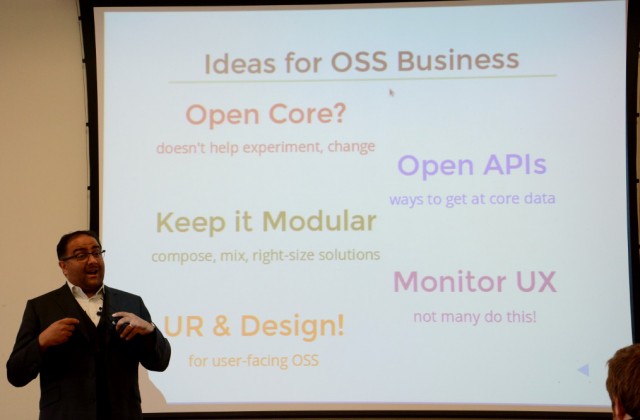Articles
- Open Source Specialist Group Project contest – the results (10/4/2016)
 The Open Source Specialist Group Project contest received a number?of high quality applications.
We are delighted to share the names winners:
The Open Source Specialist Group Project contest received a number?of high quality applications.
We are delighted to share the names winners:
- Dan Gorringe, for the category Best School Project
- Chelsea Back, for the category Best Apprenticeship Project
- Luke Robert, for the category Best First Year?Project
- BCS books programme survey (9/22/2016)

The BCS books programme supports IT managers, professionals and users by focusing on the evolving needs of people, process and technology in the workplace, enabling organisations to build IT capability in line with their strategic requirements.
We hope you will help us by taking a few moments to complete this short questionnaire. Your feedback will assist us in reviewing existing and emerging areas in IT and in establishing topics for further research and development.
- Call for Open Source Project Contest Applications (7/6/2016)

The BCS OSSG desires to support and encourage students and apprentices to use and develop open source software and hardware in their project work.
All students and apprenticesare invited to enter one of the project contests sponsored by the BCS Open Source Specialist Group. The project contests are as follows:
- Best school projectfor students who are still at secondary school or sixth form college
- Best first year projectfor students who are in their first year of study at a UK Higher Education Institution (HEI).
- Best second year projectfor students in their second year of study at a UK HEI (also those on an industrial year or 3rd year of a 4 year degree – basically this is for students between their first and final years).
- Best final year undergraduateprojectfor students in their final year of study for a BA, BSc, BEng, or in the penultimate year of an MEng (this will often be the 3rd year, but may be the fourth or fifth year, if the student has taken a year abroad, year in industry, or is studying for a 4 year Scottish degree).
- Best apprentice projectcompleted by an apprentice working in a UK company on an approved apprenticeship scheme.
The winner in each category will be awarded a cash prize of 100;application must be submitted by 15thAugust 2016.
More information at http://ossg.bcs.org/student-project-2016.
- How to Start your Open Source Business (11/27/2015)
All (almost all) the talks at the Open for Business conference, that was hosted as part of the Wuthering Bytes festival at the end of September, have been recorded and are now available on line.
This includes recordings of the talks by Tariq Rashid, Rob Blake, Stuart Mackintosh (second talk), Rob Taylor, Scott Wilson, Amanda Brock Peter Coates, Robin Kennedy, Cornelia Boldyreff and Adam Jollans.
The entire video set is also available as a playlist, allowing you to relive the day in its entirety.
Publishing the talks on-line provides a permanent repository of information that will serve as an invaluable resource to those running, starting up or considering starting, their own open source business.
All the details in the Embecosm web site.
- OSS 2016 Call For Contributions (11/3/2015)
The 12th International Conference on Open Source Systems (http://oss2016.org)
Gothenburg, Sweden, 30 May – 02 June 2016
Scope of OSS 2016
Free/Libre Open Source Software (FLOSS) has had a disruptive effect on the software industry and the ways that organizations and individuals create, distribute, acquire and use software and software-based services. The FLOSS movement has created new kinds of opportunities such as the emergence of new business models, knowledge exchange mechanisms, and collective development approaches. On the other hand, the movement has introduced new kinds of challenges, especially as different problem domains embrace openness as a pervasive problem solving strategy. FLOSS can be complex yet widespread and often cross-cultural. Consequently, they require an interdisciplinary understanding of their technical, economic, legal and socio-cultural dynamics.
Many organizations that have been known for developing proprietary software are now actively involved with FLOSS. FLOSS adoption continues to grow among businesses, governments, and other organizations. FLOSS remains important for educators and researchers, as well as an important aspect of e-government and information society initiatives, providing access to high-quality software and the code used to create it.
The goal of 12th International Conference on Open Source Systems, OSS 2016 is to provide an international forum where a diverse community of professionals from academia, industry and public sector, and diverse FLOSS initiatives can come together to share research findings and practical experiences. The conference is also a forum to provide information and education to practitioners, identify directions for further research, and to be an ongoing platform for technology transfer, no matter which form of FLOSS is being pursued.
- Making your program faster and greener (5/18/2015)
Jeremy Bennett, Embecosm
Abstract
Compilers take computer programs and translate them to the binary machine code processors actually run. Two of the most widely used compilers are completely free and open source: GCC and LLVM. In this article we look at two recent industrial research projects supported by Innovate UK, the government’s innovation agency, which advance the state of the art with these compilers.
The MAGEEC project, a joint project between Embecosm and Bristol University, is an open source machine learning framework for any compiler, which allows the compiler to be trained to generate more energy efficient code. A side-benefit is that energy efficient code turns out to be much faster code.
Superoptimization as a technique to achieve the ultimate in compiled performance has been around in academic circles for nearly 30 years.
During the summer of 2014, Innovate UK funded a feasibility study to see whether any of these techniques were commercially viable. The good news is that some techniques could now, or with a modest amount of further industrial R&D, offer exceptional benefit for real-world software. And once again the software is open source.
MAchine Guided Energy Efficient Compilation (MAGEEC)
A study carried out by James Pallister at Bristol University and funded by the UK compiler development company Embecosm in summer 2012 found that choice of compiler optimization flags had a major effect on the energy consumed by the compiled program. The bad news was that the options to be used varied from architecture to architecture and program to program [1].
The MAGEEC project was funded by the Technology Strategy Board (now Innovate UK) under its Energy Efficient Computing initiative, to develop a machine learning based compiler infrastructure capable of optimizing for energy. Running from June 2013 to November 2014, it was a joint feasibility study between Embecosm and Bristol University, to develop a machine learning compiler infrastructure that could optimize for energy. Key criteria were that the infrastructure should be generic, it should optimize for energy, that it should be based on real energy measurements, not models and that it should create a fully working system. The entire project was free and open source. (more…)
- OWASP Winter Code Sprint (10/5/2014)
 The second round of the OWASP Winter Code Sprint is now open to mid October and is looking for students to work on current open source security projects
The second round of the OWASP Winter Code Sprint is now open to mid October and is looking for students to work on current open source security projectsThe OWASP Winter Code Sprint (OWCS) is a program to involve students with Security projects. By participating in OWCS a student can get real life experience while contributing to an open source project and getting university credits.
- Volunteers needed for the Open Source SG (1/25/2013)
Would you consider helping your Specialist Group to provide a full and varied programme for BCS members and the public?
The Open Source SG of BCS is also looking for volunteers to assist with the running of the SG, which includes its events programme. There are a variety of duties available for everyone no matter how much time you are able to give.
Becoming a volunteer for BCS is a great way to expand on your CV, as well as providing a service for local members.
If you have an interest in helping the BCS Open Source Specialist Group by volunteering your services, then please contact the Member Groups Team on groups@hq.bcs.org.uk for more information on the roles available.
- Paul Richardson: Open Source Health Informatics (6/21/2010)
Paul Richardson writes:
Some of you may already know about my views on the revolutionary effect that could be triggered by the NHS adopting the use of open source software (and an open source approach to developing its own software). I have not been able to contain myself any longer and so my thoughts are now finding wider expression in a blog that I’ve started:
Earlier today I posted an article on a proposed top 10 open source projects for the NHS. I would be very interested to receive your comments. The idea is to use the blog as a focal point for an emerging community of interested parties until the point in time that a more appropriate rallying point is established.
If you are interested in this subject, you can subscribe to the blog using RSS or follow me on Twitter which I will use to announce new posts.
- 2nd Call for Papers: OpenCert 2010 (5/24/2010)
4th International Workshop on Foundations and Techniques for OPEN SOURCE SOFTWARE CERTIFICATION
- Location and date
-
Pisa, Italy – 17-18 September 2010
Satellite Event to SEFM 2010 - Website
- http://opencert.iist.unu.edu/
- Submission deadline
- 28 June, 2010
- product and process certification
- certification standards
- formal modelling and verification (model checking and theorem proving)
- software quality and reverse engineering
- static analysis, testing and inspection
- safety, security and usability certification
- language design and evolving systems
- automated source code analyses
- empirical studies
- Abstract submission: 21 June, 2010
- Paper submission deadline: 28 June, 2010
- Acceptance notification: 27 July, 2010
- Final version due: 14 August, 2010
- B. Aichernig, Graz, Austria
- A. Abdurahmanovic, PrimeKey, Sweden
- L. Barbosa, Minho, Portugal (co-chair)
- A. Capiluppi, East London, UK
- A. Cerone, UNU-IIST, Macau, SAR China (co-chair)
- G. Ciobanu, A.I. Cuza, Romania
- E. Damiani, Milano, Italy
- J. Davies, Oxford, UK
- R. di Cosmo, Paris Diderot, France
- F. Fabbrini, ISTI-CNR, Italy
- M. J. Frade, Minho, Portugal
- J. Fisteus, Madrid Carlos III, Spain
- D. Ghica, Birmingham, UK
- T. Janowski, UNU-IIST, Macau, SAR China
- P. Krishnan, Bond, Australia
- P. Milazzo, Pisa, Italy
- J. Miranda, Multicert, Portugal
- J. Noll, LERO, Ireland
- A. Petrenko, ISP-RAS, Russia
- S. Pickin, Madrid Carlos III, Spain
- S. Shaikh, Coventry, UK (co-chair)
- S. K. Sowe, UNU-MERIT, The Netherlands
- R. Treinen, Paris Diderot, France
- J. Visser, SIG, The Netherlands
- D. von Oheimb, Siemens, Germany
- T. Vos, UP Valencia, Spain
- A. Wasserman, CMU, USA
News
A special issue of Science of Computer Programming with selected papers is planned.
A final decision on this issue depends on the number and quality of the submissions.
CONTEXT & OBJECTIVES
Over the past decade, the Open Source Software (OSS) phenomenon has had a global impact on
the way software systems and and software-based services are developed, distributed and deployed.
Widely acknowledged benefits of OSS include reliability, low development and maintenance costs,
as well as rapid code turnover. Linux distributions, Apache and MySQL serve, among many other examples,
as a testimony to its success and resilience.However, state-of-the-art OSS, by the very nature of its open, unconventional, distributed
development model, make software quality assessment, let alone full certification, particularly
hard to achieve and raises important challenges both from the technical/methodological and
the managerial points of view.This makes the use of OSS, and, in particular, its integration within complex industrial-strength
applications, with stringent security requirements, a risk. And, simultaneously an opportunity and
a challenge for rigourous, mathematically based, methods in software analysis and engineering.In such a context, the aim of this workshop is to bring together researchers from academia and industry
who are broadly interested in the quality assessment of open source software projects, ultimately leading
to the establishment of coherent certification processes, at different levels.Following the success of the three previous editions (colocated to ETAPS’07, in Braga, and OSS’08,
at IFIP WCC, in Milan, and ETAPS’09, in York), the workshop will focus on formal methods and
model-based techniques that appear promising to facilitate OSS certification.
Both foundational, methodological and pragmatic issues will be addressed, through both standard
technical communications and reports on concrete case-studies and experimental data.CONTRIBUTIONS
Contributions are expected to foster a broad debate on OSS assessment and certification, integrating
techniques and elements from areas as different asSUBMISSION
The two-day workshop will feature invited talks, a pannel discussion and contributed
paper presentations. All contributions, in the form of either full technical papers,
between 10 and 16 pages, or short position papers, will undergo a peer-review process.
All papers should be written in English and in ECEASST format.Detailed information on the submission procedure are available at http://opencert.iist.unu.edu
PUBLICATION
Accepted papers will be published in Electronic Communications of the EASST (ECEASST)
A special issue of Science of Computer Programming with selected papers is planned.
A final decision on this issue depends on the number and quality of the submissions.IMPORTANT DATES
PROGRAM COMMITTEE
CONTACTS
Events
- Speed Meets Scale: Interactively Analysing and Visualising Billions of Rows with GPU-powered Analytics - When: September 4, 2019 @ 6:00 pm – 8:30 pmWhere: BCS, The Chartered Institute for IT, 25 Copthall Avenue, London. EC2R 7DN
Data analytics never seems to be fast enough, especially as data grows and the number of sources expand. The shift from legacy databases to in-memory databases helped, but the speed and scale of CPU-based solutions[...]
 Inaugural London RISC-V meetup - When: July 22, 2019 @ 5:30 pm – 8:00 pmWhere: IET London, Watson-Watt Room, 2 Savoy Pl, London WC2R 0BL
Inaugural London RISC-V meetup - When: July 22, 2019 @ 5:30 pm – 8:00 pmWhere: IET London, Watson-Watt Room, 2 Savoy Pl, London WC2R 0BLThis was the inaugural London meetup for the RISC-V community, hosted by the BCS Open Source Specialist Group and the UK Open Source Hardware User Group. As with the other UK meetups, we provided an[...]
 What’s New in Cryptography & Security - When: July 18, 2019 @ 6:00 pm – 8:30 pmWhere: BCS London, 1st Floor, The Davidson Building, 5 Southampton Street, London, WC2E 7HA
What’s New in Cryptography & Security - When: July 18, 2019 @ 6:00 pm – 8:30 pmWhere: BCS London, 1st Floor, The Davidson Building, 5 Southampton Street, London, WC2E 7HAOver the last few years the security landscape has changed in several major ways. The Internet Of Things has made security and privacy a major problem for everyone. The move to HTTPS on almost every[...]
- Makerspaces - When: June 20, 2019 @ 6:00 pm – 8:00 pmWhere: BCS London, 5 Southampton St, Covent Garden, London WC2E 7HA
At this evening meeting in London, we’ll have two talks with five speakers on Makerspaces. This is a joint meeting with the UK Open Source Hardware User Group. Tea/coffee will be served from 6pm, with[...]
- Women in Open Source - When: May 16, 2019 @ 6:00 pm – 8:00 pmWhere: BCS London, 5 Southampton St, Covent Garden, London WC2E 7HA
At this evening meeting in London, we’ll be welcoming three women, all of whom are pursuing a career in open source. This is a joint meeting with BCS Women and the UK Open Source Hardware[...]
- Open Source AI – April 2019 - When: April 5, 2019 @ 9:30 am – 8:00 pmWhere: Room 185, Polly Vacher, Computer Science Department, University of Reading, Whiteknights
A full-day Open Source AI workshop “Artificial intelligence will reach human levels by around 2029. Follow that out further to, say, 2045, we will have multiplied the intelligence, the human biological machine[...]
- Open Source Security - When: February 12, 2019 @ 7:00 pm – 9:00 pmWhere: University of Gloucestershire, Room TC014, ‘Teaching Centre’, The Park Campus, Cheltenham, GL50 2RH
This event is hosted by Cheltenham and Gloucester BCS and starts at the later time of 7pm. The evening features two talks on the theme of open source security There is no booking for this[...]
- Machines and systems of past, present, future – - When: January 17, 2019 @ 6:30 pm – 9:00 pmWhere: BCS London, 1st Floor, The Davidson Building, 5 Southampton Street, London, WC2E 7HA
For those unable to be present in person the meeting will be recorded and also live streamed over GoToMeeting: https://global.gotomeeting.com/join/773947021 You can also dial in using your phone. United Kingdom (Toll Free): 0 800 031[...]
- Open Source Fortran - When: November 15, 2018 @ 6:00 pm – 8:00 pmWhere: MMU Business School, 3rd Floor, Room 3.01 (S Atrium), All Saints, All Saints Campus, Manchester M15 6BH, UK
At this evening meeting in Manchester, we’ll be welcoming two experts in open source Fortran compilation. This is a joint meeting with the BCS Fortran Specialist Group hosted by BCS Manchester Regional Group. Venue MMU[...]
- Mentoring & Advocacy in Open Source + AGM - When: October 25, 2018 @ 6:00 pm – 8:00 pmWhere: BCS London Offices, 5 Southampton St, London WC2E 7HA, UK
Whilst open source is now more widely accepted, there are still large parts of the engineering community who have yet to “see the light”. Advocacy remains a key role for all who care about open[...]

